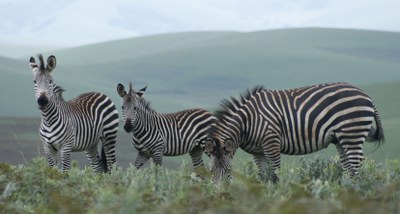East African Communities Embrace Benefits of Nature-Based Tourism

Public and private sector stakeholders in those destinations, however, are increasingly turning to nature-based solutions to help mitigate these threats. Among the voices praising this shift are community members on the front lines.
These findings run through the Economics of Natural Capital in East Africa project, in which the United States Agency for International Development and its partners in the East African Community conducted a first-of-its-kind study of the region’s natural capital and its economic value. Landscapes containing iconic wildlife, forests, grasslands, and wetlands not only cross borders but deliver critical ecosystem services upon which governments, the private sector, and millions of people are mutually dependent.
For the tourism industry, this natural capital is lifeblood. The study, however, found that natural capital is dwindling at an alarming rate, which could lead to major job losses in tourism annually (66,427 in Kenya and 31,430 in Tanzania by 2050, for example).
Fortunately, the study also identified an effective strategy for countering these threats: nature-based solutions. Its Action Plan provides many ideas and opportunities for action.
Nature-Based Solutions Transform Business as Usual
Nature-based solutions protect, sustainably manage, and restore ecosystems in ways that also address poverty, food and water security, human health, and community well-being. Recommended actions include:
- Institutionalize and harmonize transboundary efforts. Partner states, industries, and development partners must work together across transboundary landscapes to harmonize protected-area management plans and wildlife tourism offerings.
- Start valuing the financial benefits of nature-based investments. Current public and private investment processes need to start estimating the economic value of nature-based solutions so that developers and investors are equipped to compare nature-based solutions against other options.
- Strengthen funding models and revenue streams. Many nature-based solutions projects lack reliable funding. Stakeholders should pursue new investment products and market exposures such as carbon finance to protect and restore ecosystems. This approach is being developed for Masai Mara Wildlife Conservancies with support from LTG Venture Philanthropy, for example.
While the Natural Capital study offers a comprehensive look at eco-threats and countermeasures, it also provides ground-level examples of the benefits of nature-based tourism.
Rwanda’s Example: Gorilla Trekking Drives Tourism, Revenue Sharing
In the Albertine Rift Forests—a landscape that reaches into Burundi, Rwanda, and Uganda—nature-based tourism contributed an estimated $50.3 million in gross domestic product in 2018, largely thanks to the famous but critically endangered mountain gorilla (Gorilla beringei beringei).
Currently, Rwanda and Uganda are the only two countries in the world where tourists can safely visit the mountain gorilla. Just over 1,000 of the primates live in Volcanoes National Park in northwest Rwanda and in Bwindi Impenetrable National Park in Uganda. Gorilla trekking also drives additional tourism activities in the region. In 2018, the tourism sector supported 18,000 jobs in Burundi, 48,180 in Rwanda, and 28,000 in Uganda.
Protecting gorillas and their ecosystems protects tourism, but the opposite is also true if these habitats are harmed. Fortunately, gorilla tourism is currently well managed. The government of Rwanda has created tourism revenue sharing programs that ease poverty, improve community health, and drive economic empowerment. Through community-based natural resource management policies, Rwanda incentivizes habitat protection, which in turn supports continued investment in nature-based tourism. Revenue sharing programs help local residents become more personally invested as they see how conservation efforts benefit communities and individuals.
Local voice: The benefits of being a ‘Gorilla Guardian’
Near the Volcanoes National Park is a community known as Gorilla Guardians Village. There, community members follow regulations established by the Rwanda Development Board (RDB) and contribute to the park’s well-being in ways such as informing authorities about illegal activity (e.g., poachers entering the park or people collecting resources). Residents also alert authorities when park animals breach fences and enter community spaces.
Beatrice Niyibizi, a Gorilla Guardians resident interviewed as part of the study, gave an example. “When buffaloes cross the fence and destroy our crops, we are not allowed to kill that buffalo,” she said. “We rather call RDB offices and concerned authorities can address the problem.”
Niyibizi cited many benefits of the revenue-sharing programs. “When the tourists come to visit the park, we benefit as there is visitation cost paid at Rwanda Development Board. And the latter supports communities in different ways––schools are constructed and our children can now have a better education,” she said. “There are roads constructed by RDB, water tanks, and water sources. As communities we now have access to clean water––all as benefits from the park.”
“We cannot ignore the progress made so far through the tourism revenue sharing,’’ she said.
Niyibizi said she has personally benefited from being part of the Gorilla Guardians Village but also sees a collective change of behavior. “Before [establishing] this village, wildlife was threatened as many of us were always thinking of eating meat from the forest, not purchasing at the market. The number of snares was high inside the park, but if you go today, you can’t find snares, or [only] find a few of them.”
Her community now has a better understanding of how it benefits from nature-based tourism. “We have changed our mindset and behavior—we no longer think of going back to collect park resources.”
For more information:
Chihenyo Kangara
Regional Climate Change & Resilience Specialist
USAID Kenya & East Africa
Nairobi, Kenya


